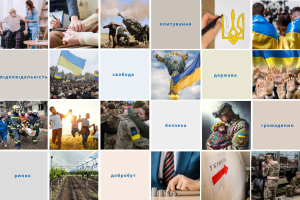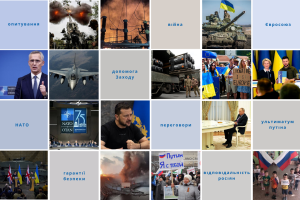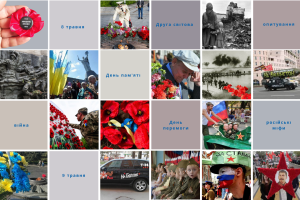The future of occupied territories in the Donbas: possible variants
The research was conducted by the Ilko Kucheriv Democratic Initiatives Foundation together with the sociological service of the Razumkov Center from December 16-19, 2016 in all regions of Ukraine with the exception of Crimea and the occupied territories in the Donetsk and Luhansk oblasts. 2,018 respondents from the ages of 18 and older were polled. The theoretical margin of error does not exceed 2.3%.
- International aid to Ukraine in its fight against Russian aggression is insufficient – such is the opinion of 53.5% of Ukrainian citizens. Significantly less – 15% -- consider such assistance essential, 14.5% heard absolutely nothing about this and it was difficult for another 17% to assess the scales and significance of such international assistance. The opinion that assistance is insufficient prevails in all regions of Ukraine.
- Only 12% of citizens give a positive assessment of the results of the Minsk agreements regarding the situation in the Donbas region: from 5% in the South of Ukraine – to 15.5% in the Donbas. 38% of the population negatively assesses the current results of the Minsk agreements, while 28% gave a neutral assessment. The most unsatisfied citizens regarding the execution of these agreements live in the West (45%) and in the East (43%), neutral assessments are predominant in public opinion in the Donbas regions, while in the South the assessments of society are equally divided between negative (33%) and neutral (31%) perceptions of the realization of the Minsk agreements. 10% know absolutely nothing about the results of the Minsk agreements, while another 11% do not have any specific opinion.
- The relative majority of Ukrainians (42%) do not support raising the issue of the status of the temporarily occupied territories in the Donetsk and Luhansk oblasts according to the results of a nationwide referendum, while 35% are “in favor” of such an initiative and 23% are undecided. The idea of such a referendum does not have the overwhelming support of the people living in any of the regions of Ukraine. In the West and the Center public opinion is divided nearly in half among those who are “for” and those who are “against” the holding of a referendum on this issue. In the South, East and the Donbas region opponents to putting this issue up for vote in a nationwide referendum are predominant.
- Support of the idea of a referendum on the status of the temporarily occupied regions of the Donetsk and Luhansk oblasts fell over the second half of 2016. In May 2016 43% of the people were in favor of putting up this issue for vote in a nationwide referendum and 37% were against, while by December 2016 the opinions of the inexpediency of holding such a referendum began to prevail (35% -- for and 42% -- against).
- Regarding the direction of state policy that Ukraine must choose to resolve the conflict in the Donbas, a particular variant does not prevail in public opinion. The orientation of people towards full and unconditional renewal of the pre-war status quo gained relatively greater support (bringing self-government and local affairs in accordance with the Constitution and laws of Ukraine, penalizing traitors and military criminals, rebuilding of the economy) – these ideas have the support of 29% of the population of Ukraine. In the regional cross-section the largest number of proponents of a renewal of the pre-war status quo resides in the Donbas (35%).
- Other variants of state policy which envisage a refusal from unconditional return to the former state of affairs have practically equal support in society. Indeed, public opinion is practically divided in half into proponents of the “tough” option – recognizing the territories as occupied, in this way isolating and practically segregating them (17.5%); proponents of reintegration at the expense of granting these territories a “special status” and consent to transforming militants into “national police forces, independent formation of bodies of the prosecutor’s office and courts, separate budget financing (14%); and proponents of continuing the current policy (a limited communications regime, the presence of military actions, limitation of a number of rights and freedoms in the ATO zone, the absence of social payouts to residents of uncontrolled territories, etc.), which are also supported by 14% of the population. In this way, the support of both the radically “tough” policy and the opposite, “excessively soft” policy (“special status” regarding uncontrolled territories) is practically identical. However, it is worth noting that one fourth of the population is totally undecided as to which variant of state policy they could or would support.
- The acceptability or non-acceptability of certain compromises proposed for the sake of establishing peace in the Donbas region by citizens of Ukraine is an extremely critical issue. Practically none of these compromises were supported by the majority of the population of Ukraine. The most inacceptable were the proposals to hold local elections as demanded by militants in the Donbas (71% consider such a compromise as unacceptable and only 10% consider them acceptable) and full amnesty of all participants of military actions against Ukrainian military forces (68% feel this is unacceptable, while 12% agree to such a compromise). Consent to special political and economic relations of the uncontrolled territories with Russia do not have the support of Ukrainian society: 60% of the people are against and 13% are in favor. Such variants of agreements as formation of local police forces, courts and the prosecutor’s office in the Separate Districts of the Donetsk and Luhansk Oblasts (SCDLO) exceptionally made up of local representatives (59% and 13%), changes to the Constitution regarding granting Russian the status of an official state language (56% and 24%), granting and fixing in the Constitution the “special status” of separate territories of the Donetsk and Luhansk oblasts (55% та 24%) and approval of the law on the neutral nonaligned status of Ukraine (45% call this an unacceptable compromise, while 30% would agree to it) appear to be predominantly unacceptable.
- In the regional cross-section granting “special status” to occupied territories appears to be the most unacceptable for residents of the Donbas (61% of residents of this region), the West (61%) and the Center (60%), while in the East the gap between those that would agree to such a compromise and the number of those for whom it is inadmissible is minimal: 38% and 41%, respectively.
- Approval of the law on the neutral or nonaligned status of Ukraine as a compromise is unacceptable for residents of Western (57%) and Central (48%) regions, while in the South and the East the opinions that such a compromise can be agreed to are predominant. In the South 44% are “in favor” and 37% “against”, in the East – 43% and 27.5%, respectively.
- Making changes to the Constitution of Ukraine to grant Russian the status of the second state language in Ukraine is not acceptable for 77% of residents of the West, 66% – Center, 48% – Donbas andі 44% – South. In the East the overwhelming majority feels such a compromise is expedient: 53% “in favor” and 28% “against”.
- Residents in none of the regions of Ukraine agree to full amnesty of all participants of military actions against the Ukrainian army, though the number of proponents of such a compromise varies between 5% in the Center and 21% in the East and South. Similarly, the idea of holding elections in the occupied territories on condition that self-proclaimed formations are nominated does not have support in any of the regions of the country. The number of those who would agree to such a compromise is the lowest in the Donbas – 6%, while the highest numbers are in the East (17%) and the South (15%). In all regions of the country the majority of citizens are similarly against the formation of local police forces, courts and prosecutor’s offices in the self-proclaimed DPR and LPR exclusively made up of local representatives.
- In the public opinion of Ukraine the attitude towards residents of temporarily uncontrolled parts of the Donetsk and Luhansk oblasts as hostages Indeed, 31% feel that the majority of residents in the occupied part of the Donbas region are hostages of certain circumstances (family, material, etc.), 24% feel these citizens became hostages to the actions of illegal armed formations and another 14.5% call them hostages of the failed policy of the central Ukrainian government regarding the liberation of these territories from Russian military forces and separatists. Those who feel that the overwhelming part of residents of the occupied territory in the Donbas are traitors, who consciously support the side of the aggressor, are in the absolute minority - only 6% of people share such an opinion. Another 11% think that those who remained on the uncontrolled territories are indifferent to their own future and the future of their country, while 14% are clearly undecided regarding their perception of people who continue to live in the occupied territory of the Donbas region. Thus, in the Ukrainian society in regard to citizens "on the other side of the delimitation line" prevails compassion and understanding of the circumstances that might influence the choice of people to remain in the occupied territory.
How do you assess current results of the Minsk agreements concerning the situation in Donbas?
1. Positively | 11,6 |
2. Negatively | 38,4 |
3. Neutrally | 28,4 |
4. I know nothing about it | 10,2 |
5. Difficult to say | 11,4 |
What policy on resolving the conflict in Donbas should Ukraine pursue?
1. Reintegration of temporarily non-controlled territories of Donbas by granting them the “special status” (transformation of rebel militants into “people’s police”, ability to appoint local prosecutors and judges, separate item of budget financing); | 13,7 |
2. Designation of these territories as occupied by Russia (full isolation and detachment from them); | 17,5 |
3. Continuation of the current policy (continuation of military actions, partial isolation, including termination of social payments and limitation of rights and freedoms in the combat zone); | 13,7 |
4. Restoration of pre-war state of affairs (ability of local government to exert its function according to the Ukrainian Constitution and laws, punishment of traitors and war criminals, economic restoration) | 28,9 |
5. Other | 1,5 |
6. Difficult to say | 24,8 |
Which compromises would you accept in order to achieve peace in Donbas?
| Acceptable | Not acceptable | Difficult to say |
1. Granting non-controlled territories of Donetsk and Luhansk oblasts the “special status” | 24,3 | 55,2 | 20,5 |
2. Adopting the law on neutral and non-aligned status of Ukraine | 29,9 | 44,8 | 25,3 |
3. Granting Russian the status of second official language through changes to the Constitution | 23,8 | 56,0 | 20,1 |
4. Full amnesty for all participants of military actions against Ukrainian army | 12,1 | 68,2 | 19,7 |
5. Conducting local elections according to the conditions set by the rebel militants | 9,6 | 71,0 | 19,4 |
6. Appointing local police, judges, and prosecutors exclusively from among the local inhabitants | 13,0 | 59,4 | 27,6 |
7. Agreeing to special political and economic relations of the temporarily non-controlled territories with Russia | 13,4 | 59,9 | 26,7 |
In your opinion, who are the majority of people that are now living (have remained) on the temporarily non-controlled territories of Donetsk and Luhansk oblasts?
1. Hostages to external conditions (family ties, material needs); | 30,9 |
2. Hostages to the actions of illegal armed forces; | 24,1 |
3. Traitors who intentionally joined the enemy side; | 5,7 |
4. People who are indifferent to their future and the future of their country; | 10,6 |
5. Hostages to the inability of the central government to liberate the territories from separatists and Russian forces; | 14,5 |
6. Difficult to say. | 14,0 |
In your opinion, is normalization of bilateral relations of Ukraine and Russia possible?
1. Yes, it is possible in the near future | 10,4 |
2. It is possible only in the distant future | 49,0 |
3. No, it is impossible | 23,8 |
4. Difficult to say | 16,8 |
If normalization of bilateral relations of Ukraine and Russia is possible, under which conditions? (Respondents could choose several options)
1. If the government (president) of Russia changes | 46,7 |
2. If military actions stop and Donbas is de-occupied | 43,1 |
3. If pro-Russian political forces come to power in Ukraine | 8,2 |
4. If annexed Crimea is returned under Ukraine’s control | 31,4 |
5. If Western countries (USA, EU) put the pressure on Ukraine to normalize the relations with Russia | 5,3 |
6. Normalization will happen in any case without any necessary preconditions | 7,6 |
7. Other | 2,2 |
8. Difficult to say | 15,3 |
Which policy of Ukrainian government towards Russia do you support the most under current conditions?
1. Restriction of contacts to the greatest extent possible, reduction of cooperation of any kind, preservation of sanctions, and introduction of visa travel regime | 35,2 |
2. Limited cooperation in the critically important spheres and issues, preservation of some contacts and bilateral dialogue, but setting “red lines” on which there could be no compromises (occupation of Crimea and Donbas) | 28,1 |
3. Search for any compromises with Russia, acceptance of Russia’s conditions on Crimea and Donbas in order to resolve the conflict as soon as possible and reinstall friendly relations | 15,0 |
4. Other | 0,8 |
5. Difficult to say | 20,9 |
How would you characterize international support that Ukraine gets in its fight against Russian aggression?
1. It is considerable | 15,1 |
2. It is not enough | 53,5 |
3. I have not heard anything about such support | 14,5 |
4. Difficult to say | 16,9 |








